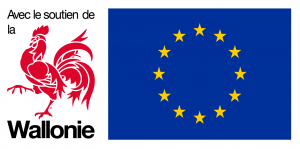Dig-e-Lab
Research & Innovation for digital learning

Objective of the project
In the zone targeted by the Programme, there are issues on workers mobility and employability. Often, those issues come from the shortage of specific education or linguistic knowledge.
In parallel, the educational video is an undeniable success. The visual contents for educational purposes are many: Youtube tutorials, TED conferences, MOOC (Massive Open Online Course)…Those online training tools can be one of the answers to the above-mentioned issues because they remove physical and social barriers. Furthermore, they are attractive for self-learning.
Nevertheless, the educational contents are not enough efficient. For example, in the MOOCs that provide mainly educational videos, only 10% learners, on average, complete their courses. The lacks of interactivity, auto-regulation competences, motivation or prerequisite are possible causes of the failure. Indeed, after having been developed, these tools progress quite often without real follow-up or reflexive analysis.
Dig-e-Lab aims at creating a dynamic of excellence in the area of online training initiatives, by using support in videos for transborder context. The consortium targets the initiatives of defined topics: training for bilingualism, training dedicated to shortage/emerged skills and training for technical skills with specialties of the borders. The project will not only analyse and adapt at the level of existing educational and technological initiatives in order to start an emulation mechanic, but also centralise and structure the different processes on its online platform.
To achieve those objectives, the project will:
- Identify, gather, outline all existing educational visual contents in an impact zone of the project and in the above-mentioned targeted topics;
- Accompany 9 contents thanks to the research and creation of stimulating and adapting supports;
- Prove the impact and the added-value of these tools by validations and evaluations on 3 trial fields; put in place actions of return and boosting to create a dynamic of excellence on the zone of the project.
 Besides the funding from the European Regional Development Fund (ERDF, European Union), Multitel receives a co-funding from Wallonia.
Besides the funding from the European Regional Development Fund (ERDF, European Union), Multitel receives a co-funding from Wallonia.
Contribution of Multitel
As a technological partner, Multitel coordinates the module 5 consisting in developing tools and protocols for the test. In the module, Multitel develops mainly customized tools based on video analysis (activity 1). A part of the developments will then integrated and used in activity 2 to calculate indicators based on video analysis. The results of these 2 activities will be eventually integrated into existing platforms (activity 4) allowing scenarios rollup, test and validate experiments done in the module 6.
Multitel will contribute in needs analysis (module 3) offering a state-of-the-art of technologies (activity 2) and the choice of the best ones (activity 4). The needs in module 3 and indicators identified in module 4, will be finally translated in detailed specifications (activity 5) allowing better technological developments in module 5.
Coordinator
- Eurometropolitan e-Campus, Belgium
Partners
- Multitel, Belgium
- Université ouverte de la Fédération Wallonie-Bruxelles, Belgium
- Université de Picardie Jules Vernes, France
- Katholieke Universiteit Leuven (KUL), Belgium
- Université de Lille 1, France
- Agence du Numérique, Belgium
